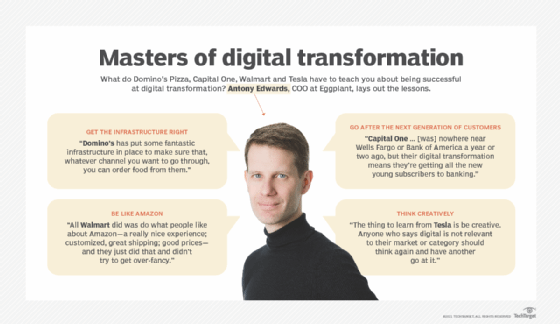
Examples of digital transformation success in business
Digital transformation entails a lot more than just implementing digital technology. If there’s one thing to learn from the many notable examples of digital transformation success, it is how having the correct organizational practices in place is imperative for winning at such initiatives.
Antony Edwards, COO at software testing and monitoring company Eggplant, classified digital transformation efforts into three types:
- Organizations that are changing their products or services to become more digital.
- Organizations that are embracing digital to change how they engage with their customers, regardless of whether their products are digital or on premises.
- Organizations that are transforming internal infrastructure to change how they work.
Despite the acceleration in digital transformation during the pandemic — 70% of organizations have increased or maintained digital transformation spend amid the pandemic, according to a global research study by IFS — experts believe unlocking digital transformation success is not everyone’s forte.
Notable examples of companies that have achieved digital transformation success
Unlocking success in digital transformation requires a clear vision and understanding across the organization, experts agreed. Utilizing digital technologies is just one piece of the puzzle. Having the right leaders in place, investing in talent and skills development, instigating cultural and behavioral changes, ensuring frequent and clear communication, and digitizing tools and processes all play key roles in driving transformational success.
Here’s a look at four notable examples of digital transformation success stories and what companies can learn from them.

1. Domino’s Pizza
Pizza giant Domino’s has been successful at implementing technology-driven transformation to evolve into “an e-commerce company that sells pizza,” as Senior Vice President and Chief Digital Officer Dennis Maloney has put it.
After the company’s stock price plummeted in 2008, Domino’s implemented a multipronged initiative aimed at revamping its menu and at using technology to increase agility. As part of its effort to deliver better products and services to customers, the company launched Domino’s Tracker, a next-gen delivery technology at the time that allowed customers to follow the progress of their order online. Today, Domino’s AnyWare technology lets customers order in more ways on more devices.
The company has touted it use of artificial intelligence and machine learning technology to improve product quality and boost store and online operations. The use of autonomous vehicles and drones for pizza delivery, in addition to its AnyWare technology, has put Domino’s in the vanguard of companies that have mastered what research firm Gartner called “multiexperience” customer service.
Experts who have studied the company’s success in infusing digital and innovation into its business agreed that its new profile as the “pizza experience company” depended on strong executive support. Creating an extensive and empowered IT department that collaborates with marketing counterparts to attract new and existing customers was also critical to the company’s digital transformation.
The ROI has been impressive. Compared with its year-end 2008 stock price of $4.71, Domino’s Pizza stock closed at $385.71 a share at time of publication — a rise of 2,152%.
“Domino’s is an example of getting the infrastructure right,” Eggplant’s Edwards said. “They have put some fantastic infrastructure in place to make sure that, whatever channel you want to go through, you can order food from them. That’s all a seamless experience across different devices.”
2. Capital One
In 2012, Virginia-based credit card giant Capital One, embarked on a transformation journey to build “a technology company that does banking instead of a bank that just uses technology,” as CEO Richard Fairbank said. The stated goal was to deliver personalized banking service in real time.
Building on a modern technology stack, the company used big data and machine learning to better understand customers. It brought in the talent required to build personalized apps, adopted cloud computing and implemented agile software development and DevOps practices, including the use of open source software.
In November 2020, it announced the closure of all eight of its on-premises data centers — becoming the first U.S. bank to do so — moving all applications and systems to Amazon Web Services. This cloud-first policy helped Capital One and its digital transformation team move away from infrastructure management and focus on accelerating customer-centric innovation by using machine learning to turn data into insights.
“Capital One is someone who just went all in on digital,” Edwards said. “They were nowhere near Wells Fargo or Bank of America a year or two ago, but their digital transformation means they’re getting all the new young subscribers to banking. They even brought in new executives to really transform into a digital company.”
3. Walmart
Retail giant Walmart has been on a journey to transform itself into a technology and innovation company, with the goal of making shopping faster and easier for its customers and offering new digital experiences.
Walmart has geared its focus from “replatforming its e-commerce business to replatforming across the board,” and put the digital transformation budget in place to do it, spending $11.7 billion on technology in 2018, according to remarks made by then-Walmart CTO Jeremy King at the 2019 National Retail Federation Big Show.
It also forged several strategic partnerships to accelerate its transformation initiatives. It partnered with Microsoft to capitalize on the cloud giant’s compute capacity to scale its artificial intelligence, machine learning and data analytics initiatives, and with Google for voice-enabled shopping.
The company has been consistently investing in digitalizing every aspect of its business — from supply chain to sales, customer service, marketing and store operations — to boost its operational and cost efficiency. Walmart’s supply chain digitalization is integral to its omnichannel strategy success, which enables the company to serve customers through online, mobile and in-store interactions.
What businesses can learn from Walmart’s “astounding” digital transformation is that they need to get the basics right, Edwards said.
“There’s no magic in digital transformation,” he said. “All Walmart did was do what people like about Amazon — a really nice experience; customized, great shipping; good prices — and they just did that and didn’t try to get over-fancy.”
4. Tesla
Electric car-maker Tesla is inarguably one of the most prominent examples of digital transformation success. By infusing technology into all facets of the driving experience, the company has positioned itself as a change agent within the automotive industry.
From Tesla cars receiving over-the-air software updates to the company setting a high bar for customer experience, Tesla has disrupted the traditional auto world in myriad ways.
Tesla’s success can be attributed to three broad technology-driven choices: cutting out any middleman in the car-buying process, extensive use of digital technology to redefine how cars are built and driven, and its approach to innovation.
Tesla’s direct-to-consumer model, where it sells directly to consumers through its website and not through franchised dealerships, has allowed Tesla to control the customer-buying experience. Tesla’s in-house production strategy — a deviation from the industry norm of sourcing components from third-party suppliers — not only provides cost advantages, but also helps the company to innovate quickly. And the velocity at which Tesla continues to innovate — the launch of Tesla Gigafactory to support Tesla’s projected vehicle demand, for example — has given the company a major edge over legacy automakers.
Today, Tesla’s market capitalization is around $830 billion it holds an 18% market share of global electric vehicle sales.
